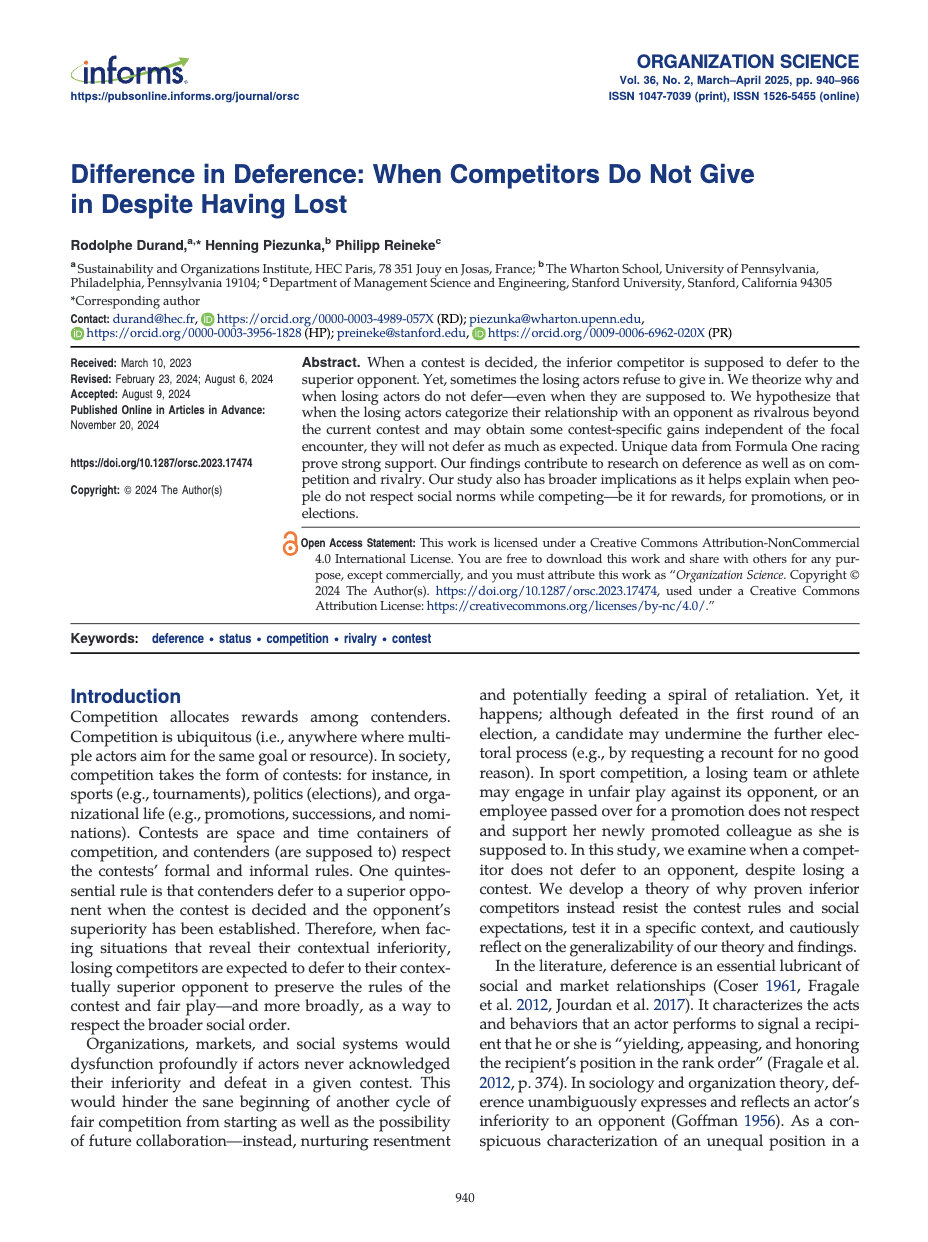Peer-Reviewed Articles
Decentralization in Organizations: A Revolution or a Mirage? (Academy of Management Annals, 2025)
with Riitta Katila and Kathleen Eisenhardt
Along with the explosive growth in decentralization of organizations and in research that studies them, skepticism has emerged regarding the possibility that decentralization is a “mirage.” Specifically, the real-world effectiveness of decentralized forms of organizing has been both praised and challenged. In other words, is decentralization a revolution or a mirage? We address this question by first examining the “ideal” form of centralized organization—bureaucracy—introduced in the 1920s. We then identify key temporal pivot points that launched new trajectories of decentralization with increasingly distributed decision-making, disrupting the ideal. We identify four pivots (multidivisional, organic, community, and platform), discuss how each challenged bureaucracy’s core assumptions of an ideal form of organizing, and highlight both the advantages and the potential limitations of each. We conclude that recent decentralization trends represent neither a revolution nor a mirage. Rather, we uncover a resurgence of evolving decentralization concepts, developed across these four historical waves of disruption. We end our review with an integrative theoretical framework that offers a fresh perspective on decentralization. It suggests opportunities to develop and validate novel theoretical claims and directs scholarly efforts toward overlooked areas such as temporal dynamics, feedback loops, measurement, and the reversal of decentralization efforts.
Difference in Deference: When Competitors Do Not Give in Despite Having Lost (Organization Science, 2025)
with Rodolphe Durand and Henning Piezunka
When a contest is decided, the inferior competitor is supposed to defer to the superior opponent. Yet, sometimes the losing actors refuse to give in. We theorize why and when losing actors do not defer—even when they are supposed to. We hypothesize that when the losing actors categorize their relationship with an opponent as rivalrous beyond the current contest and may obtain some contest-specific gains independent of the focal encounter, they will not defer as much as expected. Unique data from Formula One racing prove strong support. Our findings contribute to research on deference as well as on competition and rivalry. Our study also has broader implications as it helps explain when people do not respect social norms while competing—be it for rewards, for promotions, or in elections.
Making the most of AI and machine learning in organizations and strategy research: Supervised machine learning, causal inference, and matching models (Strategic Management Journal, 2024)
with Jason Rathje and Riitta Katila
We spotlight the use of machine learning in two-stage matching models to deal with sample selection bias. Recent advances in machine learning have unlocked new empirical possibilities for inductive theorizing. In contrast, the opportunities to use machine learning in regression studies involving large-scale data with many covariates and a causal claim are still less well understood. Our core contribution is to guide researchers in the use of machine learning approaches to choosing matching variables for enhanced causal inference in propensity score matching models. We use an analysis of real-world technology invention data of public–private relationships to demonstrate the method and find that machine learning can provide an alternative approach to ad hoc matching. However, as with any method, it is also important to understand its limitations.
Big fish vs. big pond? Entrepreneurs, established firms, and antecedents of tie formation (Academy of Management Journal, 2022)
with Riitta Katila, Henning Piezunka, and Kathleen Eisenhardt
Entrepreneurial and established firms form collaborative relationships to commercialize products. Through such ties, entrepreneurs seek (a) development help to hone ideas into marketable products and (b) access to markets. In most cases, entrepreneurs face a trade-off: they can be a big fish in a small pond, getting more attention and development help from a smaller firm with less market access, or a small fish in a big pond, getting less attention and help from a larger firm with more market access. Our study investigates what goes into choosing between these options. Drawing from resource dependence theory and an empirical study of tie formation between developers and publishers of PlayStation 2 video games, we develop and test a framework that identifies the key decision variables and focuses on two moderators—resource need evolution and resource uncertainty related to competition—that explain whether a big fish (more development help) or a big pond (more market access) drives tie formation. Our findings point to prospective peers as one of the significant decision criteria at tie formation and highlight the dynamic nature of resource dependence. Altogether, the results give resource dependence theory a dynamic element it has lacked in the past.



